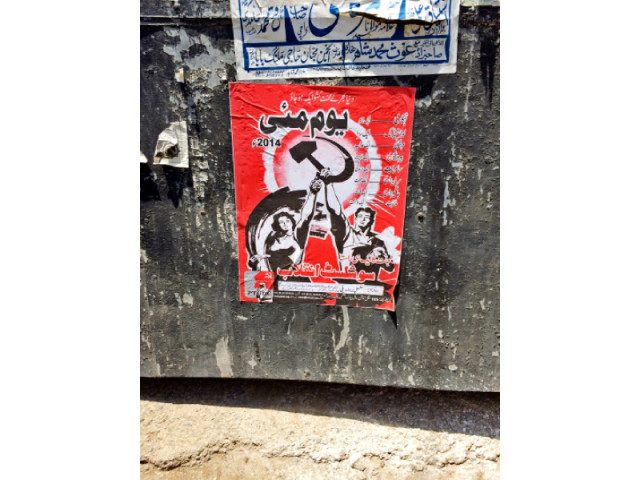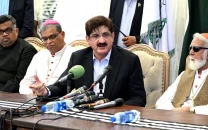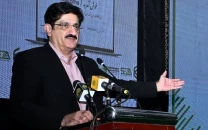Workers in agriculture, other informal sectors demand official ‘labour’ status
Dozens of rallies held in Hyderabad to mark labour rights day.

Labour unions and activists celebrated International Labour Day on May 1 and held rallies in different cities of the province. PHOTO: TOOBA MASOOD/EXPRESS
Celebrating International Labour Day on Thursday, hundreds of workers in the agriculture and other informal sectors demanded official ‘labour’ status with their due rights.
Several rallies were held in Hyderabad to mark the international labour rights day and recognise the rights available to labourers in terms of social security and protection from exploitation.
Pakistan Workers Federation’s provincial chief Abdul Latif Nizamani reiterated the demand for stricter enforcement of the Rs10,000 minimum wage, because the private sector continues to evade paying the wage. “Given the present state of inflation, the lowest wage should be doubled to Rs20,000 in the next budget,” he recommended.
Nizamani, while addressing a rally, said the government has not recognised workers engaged in a number of employment sectors. “On the one hand, the government’s regulating arm [the labour department] doesn’t effectively enforce the labour rights and, on the other, there is a huge workforce, including women and children, who are not even recognised as labourers.”
Jamila Abdul Latif, who leads the non-profit Home-Based Women Workers Federation, said their wages do not meet the minimum wage slab fixed by the government. “There also exists a gender-based disparity in wages,” she pointed out.
The Hyderabad Development Authority’s worker union held a protest, accusing the authorities of continuously depriving them of their rights by denying them their regular salaries. “The regular employees have not been paid for four months while those on contract haven’t been paid for up to seven months,” complained Muhammad Aslam Abbassi, the union’s general secretary.
Bonded labour rights
Bonded and child labour issues, despite the decade-long campaign by the rights organisations, remain neglected. Four years have passed since the devolution under the 18th Amendment, but the Sindh government has yet to implement its version of the federal Anti-Bonded Labour Abolition Act, 1992, and Employment of Children Act, 1991.
“The provincial government hasn’t so far implemented the Supreme Court’s judgment on providing social protection to brick kiln workers and bonded labourers,” said Kashif Bajeer of the Society for the Protection of the Rights of Children (Sparc) at a workshop on Thursday.
Regional Director for Labour Ghulam Sarwar Utero could not recall any action taken against an employer violating bonded labour or child rights laws for the last 12 to 13 years. “In 2001, the government barred the labour officials from carrying out spot checks at workplaces,” he said. “We were directed to give a 15-day notice before an inspection. This rule has clipped our wings as we can’t catch an offender after having issued an inspection notice,” he told The Express Tribune.
Sparc’s programme manager Zahid Thebo, who spoke at the workshop, pointed out another discrepancy in the laws concerning the age of employment for children. “The 1991 act defines a child who is not older than 14 years but section 25-A of our Constitution, which stipulates compulsory education, considers a 16-year-old as a child.”
Published in The Express Tribune, May 2nd, 2014.



















COMMENTS
Comments are moderated and generally will be posted if they are on-topic and not abusive.
For more information, please see our Comments FAQ